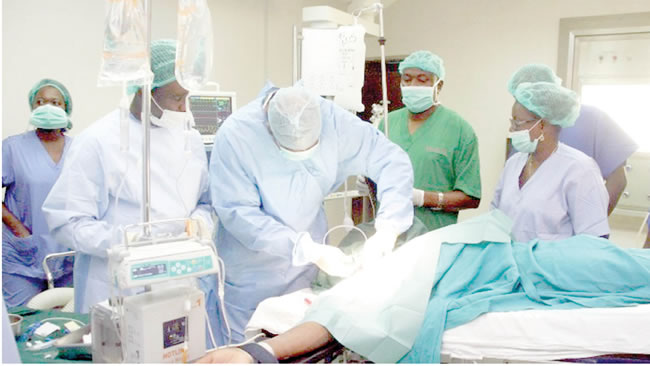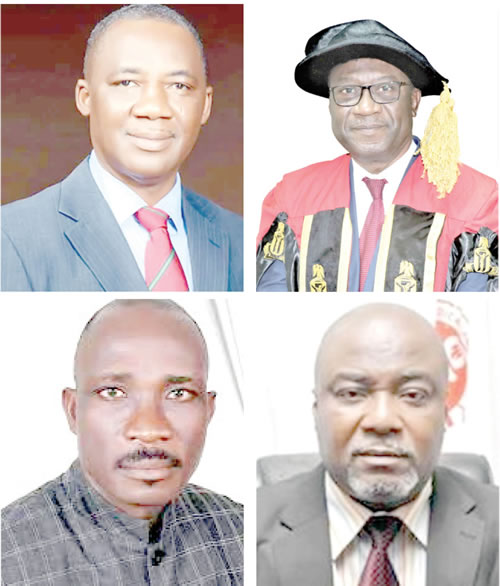SADE OGUNTOLA writes on how workers in the health sector can move beyond issues that bring about conflict and unhealthy rivalry, thereby ensuring promotion of a smooth working environment to bring about quality service delivery.
The Nigerian health system is burdened by rapid population growth, scarcity of skilled workers, and infrastructural decay. These problems, which are nested within a quandary of negative social, economic, and political pressures, are major contributory factors to the country’s poor health indices.
In recent years, there have been frequent reports of conflicts between core health professionals of different disciplines in the workplace as well. These conflicts are found to occur at different levels of health care delivery. In extreme cases, violence between cross-disciplinary professionals has been reported.
There has also been an increase in the frequency of industrial actions (IAs) by health professional groups. In the last decade, no sector has arguably been more affected by disputes and strikes in Nigeria than the health sector.
In 2020, a survey in the Journal of Multidisciplinary Healthcare that shed light on the complexities of factors perceived to cause workplace conflicts, including the extent to which these are thought to link to industrial action, indicated that the dominant themes that emerged as barriers to teamwork include professional hierarchy, role ambiguity, and poor communication. In addition, the health sector leadership and remuneration were the main themes concerning industrial actions. The salience of professional identities was also demonstrated, providing a link between inter-professional conflict in the workplace and competitive industrial actions by trade unions representing health professionals.
Yet, effective teamwork among health professionals is recognised as an essential tool for patient-centred health service delivery, and the process of providing health care is interdisciplinary, requiring health professionals to work in teams.
As such concerns are raised over such unhealthy competition among medical professionals, stakeholders in the health sector offer recommendations on how to address rivalry and improve health service delivery.
The Registrar, Medical and Dental Council of Nigeria (MDCN), Dr Tajudeen Sanusi, said promoting teamwork leads to good coordination of patient care, better utilisation of care, patient satisfaction, reduction in medical errors and patient mortality, and this essentially requires that doctors display good leadership.
He said: “It has to be earned while on the job and not to be asking for it. When a clinic starts at 8am, you as the consultant should have been there and started to do the work. Even if you cannot be on the ground, at least your resident doctors should be on the ground.
“Everything has been politicised and they believe that since they have some big man’s support, they can do just anything. That is why the problem of unhealthy rivalry among health professionals cannot be put entirely on the other health workers.”
Speaking on the issue, the National President of National Association of Nigeria Nurses and Midwives (NANNM), Comrade Michael Nnachi, said every professional group has a role in improving health outcomes by maintaining a team spirit since the health system is patient-care focused.
According to him, “the health sector is critical and every health professional is important to ensure that the patient gets the best care. Unfortunately, that unity is not there because a particular group feels another one is irrelevant or does not exist.
“Until we realise the complementary role of each professional group, we will never get things right in Nigeria’s health system. Nurses have no problems with doctors, nor doctors with nurses. Every profession has a critical role in the health sector; we need to work as a team.”
Ogirima, also a past National President of the Nigerian Medical Association (NMA), stated: “You cannot put everybody together without defining job schedule. Like the case that happened at the Obafemi Awolowo University Teaching Hospital Complex, before any procedure is conducted on a patient in the ward, you meet the matron or nurse-in-charge who will provide the trolley.
“Of course, besides the trolley, there will be things to dispose of; such things as sharps and swabs. In the end, you tell the nurses that you are through with the procedure. In fact, the nurse is by your side to assist with the procedure. The nurse then takes care of the patient, and the bedding and moves the patient back to the bed.
“Everybody is important in the care of the patient; from the messenger and the porter, to the consultants who bear the responsibility of taking care of the patient.
“So, once everybody’s job description is handed over to them at the onset and everyone knows their boundaries, there will be mutual respect. Once we are doing things right, then there will be less rivalry and disharmony will die down.”
Professor Ogirima added that established rules, such as civil service and public service procedures as well as ethics of every profession, are there to guide everyone in the health sector, and will also help to discourage misconduct or negligence.
On his part, Professor Akin Osibogun, a public health expert and former Chief Medical Director, Lagos University Teaching Hospital (LUTH), said there is a need for better enforcement of work ethics and professional ethics, followed by outright disciplinary processes in the case of any breach or non-performance of jobs as described for each cadre.
Professor Osibogun, noting that what obtains in the health sector is a reflection of the general society, added: “People assume that those coming into the profession are already aware of the ethics of that profession and work. This has to be clearly spelt out. We must show more interest in training them on work and professional ethics.
“This need to be emphasised so that we can get quality output from our health workers. There must be clearly spelt-out processes for addressing misbehaviour and rewarding good service.
“When I was the CMD at LUTH, I developed a code of norms and conduct for the workers. Every institution must have clearly spelt-out guidelines for normal or incorrect behaviour.”
Professor Wole Atoyebi, a surgeon at LUTH, Lagos, said the increasing cases of undue competition and rivalry, violation of intra- and inter-professional chains of command, sabotage of efforts of competing practitioners and, in some cases, outright hatred of other professionals, are not common in private hospitals but in public institutions.
Professor Atoyebi, a former registrar of the National Postgraduate Medical College, said over the years, people have been left to claim “territorialism”, and they think they should be their own because there are no job specifications that everyone will sign into on employment in government hospitals, and this had resulted in undue competition and rivalry.
He said: “In the olden days, when people are not just so focused on playing territorial ambition, there was nothing like undue competition and rivalry, violation of intra- and inter-professional chains of command, sabotage of efforts of competing practitioners. There was collaboration and cooperation in the medical team. We watched each other’s backs and we worked together.
“But over the years, people now want to claim that this is my own territory and that is what is leading to the problem. So, once there is a job specification written down and issued at the onset of the job, you will not claim what is not yours. The time has come for us to take proper action.”
Professor Atoyebi also said these issues had nothing to do with training points for the different cadre of health workers while in school.
He added: “We have been training together. In fact, they live in the same hostel. So, there is no rancour while training. The problem is on graduation, after they meet the older ones in the course of working,” he stated.
On his part, Professor Innocent Ajuh, a consultant obstetrician and gynaecologist, stated that the undue competition and rivalry is a general problem in all sectors of the economy in Nigeria, not only in the health sector, and it is not about the profession but individuals.
“Individual factors contribute to what is termed inter-professional rivalry and the reality is that if you realise what JOHESU means, it covers every member of the hospital community except doctors. Individuals need to be contented to practise based on their professional calling, rather than seeking positions and relevance.
“Abroad, nobody will ask who is a nurse or doctor. Everybody knows where they belong. Everybody is important on the health team, but there is collaboration and it requires that everyone does their job.”
In his contribution, Dr Samuel Adeyemi, Oyo State chairman of NANMM, said such issues as violation of intra- and inter-professional chains of command, sabotage of efforts of competing practitioners and poor understanding between doctors and nurses, became an issue because of no forbearance.
He said: “As nurses, our background says we are to coordinate the activities of the health team. The younger doctors will tell us that they are the head of the team, but it is not completely explained to them that that demands that they work for the betterment of the health team and its unity as a family. As head of the team, they must be cordial, carry everyone along, be unbiased, humane and have a listening ear. Respect is earned not commanded.
“We all have to sheathe our swords. We have to bury our pride and always remember that we have the same goal, which is patient care. I want to appeal that senior nurses talk to their junior ones, while the doctors also talk to the junior ones to ensure that peace reigns in the health sector.”
Finding solutions to this challenge, however, may involve a multi-dimensional approach. Government at all levels must put in place policies that recognise the different roles of health professionals, and also encourage interprofessional working relationships.
The World Health Organisation (WHO) defines inter-professional collaboration as a situation in which “multiple health workers from different professional backgrounds work together with patients, families, caregivers, and communities to deliver the highest quality of care”. This is essentially a situation in which health care professionals assume complementary roles and work together, sharing responsibility for problem-solving and making decisions to formulate and carry out plans for patient care.
There is considerable evidence that inter-professional teamwork enhances communication, reduces errors, and improves patient outcome and satisfaction as well as staff satisfaction. These outcomes also lead to enhanced patient/client self-care, knowledge and outcomes, provider satisfaction, skills and practice behaviours.
Building effective healthcare systems do not depend on technical factors or infrastructural adequacy alone. Human factors are very important. Unity is strength. When there is teamwork and collaboration, wonderful things can be achieved. The key word here is “together”. This model was also suggested by the Institute of Medicine (IOM), the American health policy think-tank, as a veritable tool for improving multi-disciplinary care of patients. Critical components that make up this concept must, however, be put in place for it to succeed. These include clear role definition/role clarification of professionals in the health team. There should be clear, unambiguous guidelines stipulating the roles, responsibilities and limits of all the different professionals in the sector. This surely has always existed in some form, but the lines of responsibility seem to have been blurred in recent agitations. The Federal Ministry of Health also has a role to play in this regard.
YOU SHOULD NOT MISS THESE HEADLINES FROM NIGERIAN TRIBUNE
Woman’s Corpse, Unconscious Man Found Inside Office In Aba After Four Days
A woman was found dead and another man unconscious in an office located at No 7, Factory Road off Eziukwu Bus Stop, Aba, Abia State at the weekend.
Nurse Holds Doctor Hostage In OAU Teaching Hospital, Resident Doctors Plan Strike
Insecurity: ADC presidential candidate, Kachikwu, to give state of nation address Tuesday
The association of resident doctors (ARD) at the Obafemi Awolowo University Teaching Hospital (OAUTHC) Ile-Ife has concluded plans to go on strike over what they termed recurrent harassment of doctors at the hospital.
ALSO READ FROM NIGERIAN TRIBUNE
- Nurse Holds Doctor Hostage In OAU Teaching Hospital, Resident Doctors Plan Strike
- Woman’s Corpse, Unconscious Man Found Inside Office In Aba After Four Days
- Hoodlums Attack Lagos Governor’s Press Crew Bus In Tinubu’s Convoy, Two Injured
- [BREAKING] #EkitiDecides2022: INEC Declares APC’s Biodun Oyebanji Winner Of Guber Poll
- Top 10 Business Ideas In Nigeria You Can Start With 100,000 Naira
- 2023: Kwankwaso Will Not Be Deputy To Obi —NNPP







